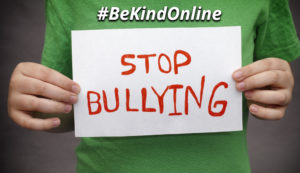
 The APS Approach and Tips for Parents
The APS Approach and Tips for Parents
As educators, APS staff recognize that the necessary ingredients for creating a safe school environment that is free of bullying, harassment and violence include adults working together to identify and respond to bullying, and teaching students important social emotional skills to help them in life.
How do we identify bullying behavior? Bullying can appear in many forms:
- Physical bullying – kicking, hitting, biting, pinching, hair pulling, pushing or making threats
- Verbal bullying – name calling, spreading rumors, persistent teasing or verbal assaults
- Emotional bullying – intimidation, racial slurs and gestures, unwanted physical contact or offensive gestures
- Cyberbullying – emails, websites, chat rooms, instant messaging and texting, meant to threaten, harass, embarrass or target someone
Every adult is a first line responder in addressing any bullying or harassment behavior. While students may have learned some tools to recognize and respond to bullying, they are all encouraged to reach out to a trusted adult – at school, at home or in the community – to report bullying and harassment that they experience or witness.
Under the umbrella of state guidelines and APS policies, we focus on providing support to the students involved, investigating what happened, and taking appropriate actions to address the problem. Then school counselors and student services staff work with any students who have experienced, witnessed or displayed bullying behaviors and will coordinate with the students’ families to provide support.
In APS classrooms over the past three years, counselors have focused on providing consistent social-emotional instruction in all APS elementary and middle schools. Adding social emotional learning to our instructional program is a critical part of building a safe school. Students become socially competent citizens by learning about empathy, emotion regulation, problem solving, bullying prevention, and other necessary life-skills. Building these important social and emotional skills in elementary and middle school helps students build resiliency. By working to apply these skills within their schools, students become empowered to build a safe and positive climate and culture. Most importantly, children who feel comfortable in a safe and supportive environment are ready to learn and contribute.
Finally, we believe parent and community education is important. All adults need to know how to recognize bullying and to address it in their own lives. Here are three questions parents should consider:
- Is my child being bullied? Some might not tell you. Look for unexplainable injuries, difficulty sleeping or nightmares, feeling sick or faking illness, changes in eating habits, lost or destroyed items. Parents may want to document what’s happening and talk to school staff.
- Is my child demonstrating bullying behaviors? Do they get into physical/verbal fights, are they becoming increasingly aggressive, are they getting sent to the Principal’s office, do they have friends who engage in bullying behavior, do they blame others for their problems or do they have unexplained extra money or new belongings?
- What if my child witnesses bullying behaviors? They may feel pressure to participate, worry that adults are not in control, or feel guilt, powerlessness and anxiety.
Everyone can help!
Here are a few quick ways parents can help:
- Teach your child to speak out against bullying. If your child observes an incident of bullying, they should inform an adult. It is important to be a good observer and report the facts of the situation. This is not “tattling.”
- It takes courage to do the right thing. Encourage your child to reach out to a victim of bullying by being kind. Your child can help the victim talk to an adult.
- Emphasize safety to your child. If your child feels safe, it is OK to say something like “Stop! That’s not funny!” It is also OK not to confront a bully, but rather to seek assistance from an adult. It is never OK to bully back!
More resources are available online to help families, or you can contact the school counselor or principal in your child’s school. You can also call the Office of Student Services 703-228-6062 or the Department of Administrative Services at 703-228-6008.
All of us know that bullying is hard to eradicate – as adults, we often see evidence of bullying almost every day, frequently in the news and among adults and children in the community. Let’s partner to eradicate bullying in APS schools. Many hands are needed and we all have a role.
 Contact
Contact  Calendars
Calendars Careers
Careers Engage
Engage  District
District


